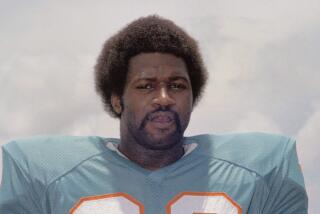The Little Giant : Running Back Joe Morris Is Only 5-7, but He’s Becoming a Big Man in N.Y.
- Share via
EAST RUTHERFORD, N.J. — This, of course, will forever remain the land of the Giants, but oh, one day in November . . .
The New York Giants beat the Tampa Bay Buccaneers here last week and can thank two guys who have to stand tippy-toed on a stool to change a light bulb in their kitchens.
What a great week to be five-foot-seven.
It started Sunday in Giants Stadium when a stubby substitute high school teacher from New Jersey put down his ruler long enough to kick five field goals in the Giants’ 22-20 win over Tampa Bay.
But Eric Schubert, hero that he was, was only half of this short story, the other being a pint-sized running back named Joe Morris, who rushed for a career-high 132 yards against the Buccaneers and scored the Giants’ only touchdown.
So there you have it. The six-foot-and-under-club of Schubert and Morris accounted for all the Giants’ scoring.
What would Dick Butkus say?
These pair of 5-7s not only helped the Giants improve their record to 6-3, but they also gave this Sunday’s opponent, the Rams, something else to think about.
The Rams (8-1) figured they’d lose enough sleep this week worrying about real monsters like All-Pro linebacker Lawrence Taylor.
But the thought of a player slipping through a pair of legs for a touchdown might be too much to handle.
But, the thing is, Joe Morris would just as soon run through you, too.
Phil McConkey, Giant wide receiver, has seen it happen.
“You look at some of the defenders after they hit Joe,” McConkey said. “They’re just shaking their heads. He’s like a freight train coming through the line.”
McConkey, hardly a giant among Giants at 5-10 and 170 pounds, is one who can appreciate being small in a big man’s game.
“What guys like Morris have inside of them can’t be measured,” he said. “That’s one of the great things about this game.”
Joe Morris doesn’t like talking much about himself. He’s nice, but intense.
After last Sunday’s performance, in which he ran for 116 yards in the second half alone, Morris was in and out of the locker room before reporters had a chance to pounce.
“I had nothing to say,” Morris said the next day.
Morris clearly wears the scars of someone who has had to prove himself all his life.
“When you’re smaller than everyone else, you have to,” he said.
It started as a kid back in Southern Pines, S.C. In grade school, little Joe Morris thought he had to be a bully.
“I used to beat up all the bigger kids for no other reason other than they were bigger than me,” Morris said. “It was my way of saying, ‘Hey you’re on my level and don’t you forget it.’ ”
And you would have wanted no part of a Southern Pines rock fight in which Morris was involved.
“In order to win a rock fight, you had to hurt someone,” he said. “Shots in the leg wouldn’t do you any good. You had to throw at the head. It was the only way you won. We’d have rock fights with people two streets over. The key was getting up close and unloading on them, I mean unloading on them. They’d go home crying and wouldn’t want to play anymore.”
Play?
Luckily for the NFL, Morris decided to put down his boulders and instead lower his shoulders into linebackers.
The rock fights evolved into street games like football and basketball, in which you had only to worry about low-bridging and the subsequent picking of gravel from foreheads.
Joe remembers the day in grade school when his attitude changed. He got in some trouble at school one day and his mother sat him down that night.
Morris’ father, a career army man, was fighting in Vietnam at the time.
“She said, ‘Your father is over there trying to stay alive and he doesn’t need to worry about you,’ ” Morris recalled. “She said she knew I was a good son. And, outside of beating people up, I was a good son. But I didn’t want to do anything to embarrass my parents. That changed my attitude about beating people up.”
He started compensating for his size through weight-training.
He still spends hours in the weight room and that’s how he can make like a freight train coming through the line.
His satisfaction now comes not from press clippings or adulation, but from within. That little Joe Morris has lasted four years in the NFL is a testimony to his will. He’s fought off the critics and competition time and again.
Joe Morris languished on the bench for the better part of his first three years with the Giants, but enters Sunday’s game here at Giants Stadium in the Meadowlands against the Rams with 573 yards for the season. He’s had back-to-back 100-yard games but still, deep inside, wonders if it will ever be enough.
A lot of people told Joe that it would be a mistake going to Syracuse out of high school, the theory being that nice little backs should go to nice little schools.
Morris went to Syracuse anyway and broke Larry Csonka’s all-time rushing record.
He was the Giants’ second-round draft choice in 1982, but their first-round pick was a running back from Michigan, Butch Woolfolk.
Last season, Woolfolk was injured against Dallas late in the season, and Morris filled in strongly and finished with 510 yards rushing.
Of course, the Giants searched for more running backs.
Their first pick was Kentucky back George Adams. The Giants also picked up Maurice Carthon from the USFL’s New Jersey Generals.
What it did was create another log-jam in the backfield. The Giants are not afraid to use five backs in a given game (Morris, Adams, Carthon, Rob Carpenter and Tony Galbreath.)
Morris didn’t do cartwheels when the Giants drafted Adams, but again he managed to fight off the competition.
“It’s been a good thing for me,” he said. “Besides, I’m a veteran now. I’ve fumbled the ball, I’ve missed blitzes, I’ve done all the things he’s going to do in his career. I’ve done it and I’ve survived it.”
Morris knows he’s never going to shake his small-guy image. His size is something NFL coaches can’t ignore.
McConkey knows the feeling, too.
“If Joe was 6-2 and 200 pounds, no one would say a word,” he said. “But because he’s 5-7, you hear that he can’t do things, that he’s going to wear down.”
Morris:” I have to be on a high intensity level to compete on this level. Without that extra thing, I’m just an average player. And you can’t be average in a big man’s game. I have to be something special. If I’m not, there’s no reason to have me out there.”
Morris was plenty special against Tampa Bay. In the second half, he dominated a few drives the way Eric Dickerson can with the Rams.
With the game tied at 13 in the third quarter, the Giants started a drive at their 42 and gave Morris the ball five times in the first eight plays, eventually leading to a Schubert field goal.
A 19-yard Morris run early in the fourth quarter led to another field goal, and he ran the ball five times (20 yards) on the Giant next drive to set up Schubert’s final field goal.
But Morris runs like every run might be his last.
And, ask Giant Coach Bill Parcells, Morris hates standing on the sideline.
Earlier this season, in a game against the Washington Redskins, Morris suffered a mild concussion early in the game but was miffed when Parcells refused to put him back in the game.
“I yelled at him for three quarters,” Morris recalled. “But he wouldn’t put me back in the game. He said, ‘If I put you back in the game and you die, how do you think I’m going to feel?’ ”
Morris got banged up again against New Orleans and Parcells took him out again.
But, near the end of the half, there was Morris again, yapping in Parcells’ ear.
“I told him, ‘Hey, this isn’t Washington and I’m not in the Twilight Zone. I’m ready to play.’ ”
Parcells, though, only had to point out to Morris that there were only 11 seconds left in the half and the Saints had the ball.
Funny, but when you’re 5-7 and always fighting for your paycheck, those things don’t seem to matter.
More to Read
Go beyond the scoreboard
Get the latest on L.A.'s teams in the daily Sports Report newsletter.
You may occasionally receive promotional content from the Los Angeles Times.











